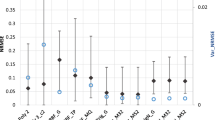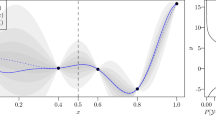Abstract
Metamodeling, i.e., building surrogate models to expensive black-box functions, is an interesting way to reduce the computational burden for optimization purpose. Kriging is a popular metamodel based on Gaussian process theory, whose statistical properties have been exploited to build efficient global optimization algorithms. Single and multi-objective extensions have been proposed to deal with constrained optimization when the constraints are also evaluated numerically. This paper first compares these methods on a representative analytical benchmark. A new multi-objective approach is then proposed to also take into account the prediction accuracy of the constraints. A numerical evaluation is provided on the same analytical benchmark and a realistic aerospace case study.












Similar content being viewed by others
References
Krige, D.G.: A statistical approach to some basic mine valuation problems on the witwatersrand. J. Chem. Metall. Min. Soc. S. Afr. 52(6), 119–139 (1951)
Schonlau, M., Welch, W.J.: Global optimization with nonparametric function fitting. In: Proceedings of the ASA, Section on Physical and Engineering Sciences, pp. 183–186. (1996)
Jones, D.R., Schonlau, M.J., Welch, W.J.: Efficient global optimization of expensive black-box functions. J. Glob. Optim. 13(4), 455–492 (1998)
Kushner, H.J.: A new method of locating the maximum point of an arbitrary multipeak curve in the presence of noise. J. Fluids Eng. 86(1), 97–106 (1964)
Kleijnen, J.P.C.: Kriging metamodeling in simulation: a review. Eur. J. Oper. Res. 192(3), 707–716 (2009)
Picheny, V.: A stepwise uncertainty reduction approach to constrained global optimization. In: Proceedings of the Seventeenth International Conference on Artificial Intelligence and Statistics, Reykjavik, Iceland, pp. 787–795. (2014)
Basudhar, A., Dribusch, C., Lacaze, S., Missoum, S.: Constrained efficient global optimization with support vector machines. Struct. Multidiscip. Optim. 46(2), 201–221 (2012)
Parr, J.M., Keane, A.J., Forrester, A.I.J., Holden, C.M.E.: Infill sampling criteria for surrogate-based optimization with constraint handling. Eng. Optim. 44(10), 1147–1166 (2012)
Fletcher, R., Leyffer, S.: Nonlinear programming without a penalty function. Math. Program. 91(2), 239–269 (2002)
Audet, C., Dennis Jr, J.E.: A pattern search filter method for nonlinear programming without derivatives. SIAM J. Optim. 14(4), 980–1010 (2004)
Audet, C., Dennis Jr, J.E.: A progressive barrier for derivative-free nonlinear programming. SIAM J. Optim. 20(1), 445–472 (2009)
Le Digabel, S.: Algorithm 909: NOMAD: nonlinear optimization with the MADS algorithm. ACM Trans. Math. Softw. 37(4), 44 (2011)
Rasmussen, C.E., Williams, C.K.I.: Gaussian Processes for Machine Learning. Springer, New York (2006)
Vazquez, E.: Modélisation comportementale de systèmes non-linéaires multivariables par méthodes à noyaux et applications. PhD thesis, Université Paris Sud-Paris XI. (2005)
Santner, T.J., Williams, B.J., Notz, W.: The Design and Analysis of Computer Experiments. Springer, Berlin (2003)
Hansen, N., Kern, S.: Evaluating the CMA evolution strategy on multimodal test functions. In: Parallel Problem Solving from Nature-PPSN VIII, pp. 282–291. Springer, New York (2004)
Jones, D.R.: A taxonomy of global optimization methods based on response surfaces. J. Glob. Optim. 21(4), 345–383 (2001)
Forrester, A.I.J., Sobester, A., Keane, A.J.: Engineering Design via Surrogate Modelling: A Practical Guide. Wiley, Chichester (2008)
Sasena, M.J.: Flexibility and efficiency enhancements for constrained global design optimization with Kriging approximations. PhD Thesis, University of Michigan, Ann Arbor. (2002)
Jones, D.R., Perttunen, C.D., Stuckman, B.E.: Lipschitzian optimization without the Lipschitz constant. J. Optim. Theory Appl. 79(1), 157–181 (1993)
Vazquez, E., Bect, J.: Convergence properties of the expected improvement algorithm with fixed mean and covariance functions. J. Stat. Plan. Inference 140(11), 3088–3095 (2010)
Sasena, M.J., Papalambros, P.Y., Goovaerts, P.: The use of surrogate modeling algorithms to exploit disparities in function computation time within simulation-based optimization. Constraints 2, 5 (2001)
Audet, C., Dennis Jr, J.E.: Mesh adaptive direct search algorithms for constrained optimization. SIAM J. Optim. 17(1), 188–217 (2006)
Hansen, N.: The CMA evolution strategy: a comparing review. In Towards a New Evolutionary Computation, pp. 75–102. Springer, New York (2006)
Audet,C., Booker, A.J., Dennis Jr., J.E., Frank, P.D., Moore, D.W.: A surrogate-model-based method for constrained optimization. In: Proceedings of the 8th AIAA/NASA/USAF/ISSMO Symposium on Multidisciplinary Analysis and Optimization, Long Beach, CA, USA. Paper No. AIAA-2000-4891 (2000)
Parr, J.M., Forrester, A.I.J., Keane, A.J., Holden, C.M.E.: Enhancing infill sampling criteria for surrogate-based constrained optimization. J. Comput. Methods Sci. Eng. 12(1), 25–45 (2012)
Waldock, A., Corne, D.: Multiple objective optimisation applied to route planning. In: Proceedings of the 13th Annual Conference on Genetic and Evolutionary Computation, Dublin, pp. 1827–1834. ACM (2011)
Deb, K.: Multi-objective Optimization Using Evolutionary Algorithms. Wiley, Chichester (2001)
Audet, C., Savard, G., Zghal, W.: A mesh adaptive direct search algorithm for multiobjective optimization. Eur. J. Oper. Res. 204(3), 545–556 (2010)
Acknowledgments
The authors are indebted to Sébastien Defoort (ONERA) for the definition of the booster benchmark model.
Author information
Authors and Affiliations
Corresponding author
Rights and permissions
About this article
Cite this article
Durantin, C., Marzat, J. & Balesdent, M. Analysis of multi-objective Kriging-based methods for constrained global optimization. Comput Optim Appl 63, 903–926 (2016). https://doi.org/10.1007/s10589-015-9789-6
Received:
Published:
Issue Date:
DOI: https://doi.org/10.1007/s10589-015-9789-6




